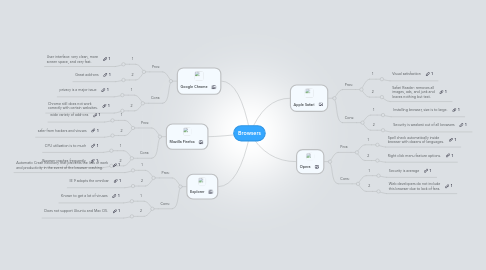
1. Google Chrome
1.1. Pros:
1.1.1. 1
1.1.1.1. User interface: very clean, more screen space, and very fast.
1.1.2. 2
1.1.2.1. Great add-ons
1.2. Cons:
1.2.1. 1
1.2.1.1. privacy is a major issue
1.2.2. 2
1.2.2.1. Chrome still does not work correctly with certain websites.
2. Mozilla Firefox
2.1. Pros:
2.1.1. 1
2.1.1.1. wide variety of add-ons
2.1.2. 2
2.1.2.1. safer from hackers and viruses
2.2. Cons:
2.2.1. 1
2.2.1.1. CPU utilization is to much
2.2.2. 2
2.2.2.1. Browser crashes frequently
3. Explorer
3.1. Pros:
3.1.1. 1
3.1.1.1. Automatic Crash Recovery that prevents the loss of work and productivity in the event of the browser crashing.
3.1.2. 2
3.1.2.1. IE 9 adopts the omnibar
3.2. Cons:
3.2.1. 1
3.2.1.1. Known to get a lot of viruses
3.2.2. 2
3.2.2.1. Does not support Ubuntu and Mac OS.
4. Apple Safari
4.1. Pros:
4.1.1. 1
4.1.1.1. Visual satisfaction
4.1.2. 2
4.1.2.1. Safari Reader: removes all images, ads, and junk and leaves nothing but text.
4.2. Cons:
4.2.1. 1
4.2.1.1. Installing browser, size is to large.
4.2.2. 2
4.2.2.1. Security is weakest out of all browsers
5. Opera
5.1. Pros:
5.1.1. 1
5.1.1.1. Spell check automatically inside browser with dozens of languages.
5.1.2. 2
5.1.2.1. Right click menu feature options.
5.2. Cons:
5.2.1. 1
5.2.1.1. Security is average
5.2.2. 2
5.2.2.1. Web developers do not include this browser due to lack of fans.
